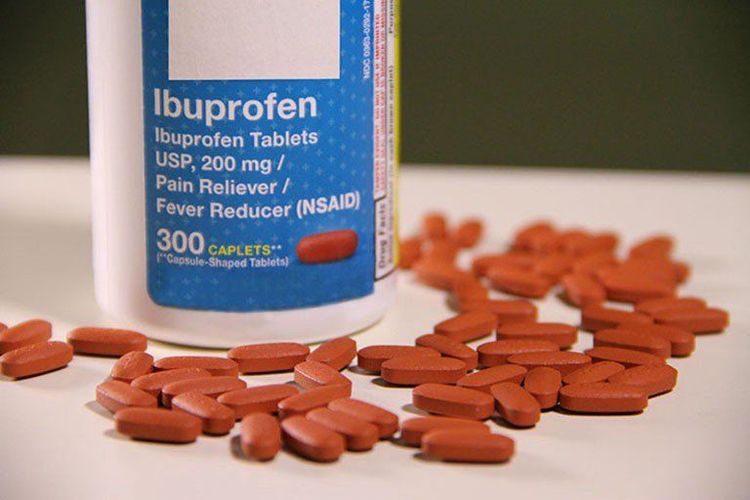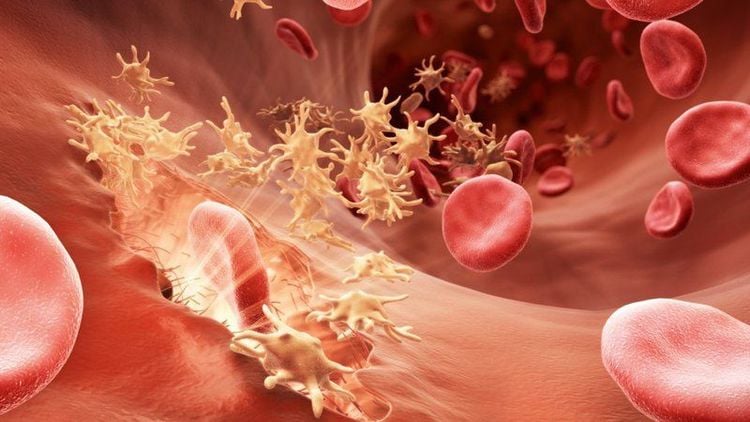This is an automatically translated article.
The anti-inflammatory drug ibuprofen is used quite widely, has many effects such as pain relief, anti-inflammatory, antipyretic. The drug is prescribed for patients with symptoms of moderate to mild pain, fever. However, there are a few things to keep in mind when using it.
1. What is the anti-inflammatory drug ibuprofen?
Ibuprofen belongs to the group of non-steroidal anti-inflammatory drugs (NSAIDs), whose main effects are anti-inflammatory, antipyretic, analgesic and antiplatelet.The drug has dosage forms such as: Tablets; film-coated tablets, sugar-coated tablets; capsule
2. Effect of anti-inflammatory drug Ibuprofen
2.1 Analgesic effect Mechanism of analgesic effect of ibuprofen: Reduces the synthesis of prostaglandin E2α thereby reducing the sensitivity to pain agents of the apex of sensory nerve fibers. The agents are chemical mediators produced during inflammation such as histamine, bradykinin.
The anti-inflammatory drug ibuprofen is used in cases of mild to moderate pain, localized pain; Unlike steroid pain relievers, they do not cause pleasure, do not relieve visceral pain, and are not addictive.
Indicated in cases of pain such as: toothache, pain due to chronic arthritis, menstrual pain, headache, muscle pain due to vascular movement.
2.2 Antipyretic effect Mechanism of action: When foreign agents enter the body to stimulate white blood cells to produce intrinsic pyrogens, activating the enzyme Cyclooxygenase (COX) will cause the formation of PGE1, E2 in the region. hypothalamus, thereby triggering a febrile response. The anti-inflammatory drug ibuprofen inhibits the COX enzyme that catalyzes the formation of PG E1, E2 in the hypothalamus, thereby causing an antipyretic effect. Antipyretic effect in the presence of febrile agents, but not hypothermia in normal subjects.

Thuốc kháng viêm ibuprofen có tác dụng hạ sốt
2.3 Anti-inflammatory effects Mechanism: Non-steroidal anti-inflammatory drugs including ibuprofen inhibit COX enzymes thereby inhibiting the biosynthesis of PGs, which are chemical mediators of inflammatory responses. In addition, the drug also stabilizes the lysosomal membrane to limit the release of enzymes during phagocytosis; They also inhibit the migration of leukocytes, inhibiting the antigen-antibody response, thereby reducing inflammation.
Characteristics of action:
Anti-inflammatory effect on most of the causes of inflammation. New high doses have anti-inflammatory effects. Used in cases such as: Arthritis, can be used to relieve pain in acute gout...
2.4 Antiplatelet effect Non-steroidal anti-inflammatory drugs have antiplatelet effect. except paracetamol, however ibuprofen is not commonly used for this effect.
3. How to use the anti-inflammatory drug ibuprofen
Indications: The drug is indicated in the following diseasesChronic arthritis Pain relief for moderate and mild pain. Use to reduce fever due to causes with no contraindications

Hình ảnh thuốc chống viêm ibuprofen
Contraindications:
Peptic ulcer disease. Liver failure, kidney failure. In patients with bleeding from other causes, antipyretic should not be used unless the cause of dengue fever is excluded. Need to consult a doctor when using for the following subjects: Pregnant and lactating women; Have a history of allergy to NSAIDs; Asthma; Systemic diseases such as diabetes mellitus, hypertension.
Dosage: Depending on each specific case, there are different dosages
Dosage for children:
Antipyretic for children (Over 6 months - 12 years old): In case the cause of dengue fever is excluded. , used to reduce fever for children with a dose of 5mg/kg body weight when the body temperature is < 39.2 degrees Celsius every 6-8 hours if the child has a fever again; dose 10mg/kg body weight when the number is >=39.2 degrees Celsius every 6-8 hours if the child has a fever again. For pain relief: Dose from 4-10mg/kg body weight every 6-8 hours. The maximum dose is 40 mg/kg body weight. Treatment of arthritis: For children from 6 months to 12 years old, the dose is 30-40mg/kg/day divided into 3-4 times, gradually increasing the dose. If mild, little pain, mild inflammatory reaction, use a lower dose of 20mg/kg/day. Dosage for adults
Antipyretic: Use 200mg-400mg every 4-6 hours if fever again over 38.5 degrees Celsius; or can be administered intravenously. Pain relief: Dysmenorrhea: 200mg-400mg orally every 4-6 hours as needed. Mild to moderate pain relief: 200-400mg orally every 4-6 hours as needed, or intravenously. Anti-inflammatory effect: Anti-inflammatory in case of arthritis dose from 400mg-800mg every 6-8 hours.

Người bệnh dùng thuốc chống viêm ibuprofen theo đúng chỉ định của bác sĩ điều trị
4. Unwanted effects when using ibuprofen
Note when using the drug, there may be some unwanted effects such as:
Side effects on the gastrointestinal tract: Due to inhibition of PG synthesis, it leads to a decrease in the production of mucus, a protective factor for the stomach lining. gastroduodenal disease can cause gastroduodenal inflammation. However, this effect of ibuprofen is quite mild compared to other drugs in the same class. On the kidney: If used for a long time, reduces blood flow to the kidneys, reduces glomerular filtration rate, causing renal dysfunction. Causes symptoms such as little urine, no urination, edema. Allergic reactions: Facial swelling, difficulty breathing, skin rash... May experience shortness of breath, chest pain, vision loss, weakness, false asthma attack. Cause bleeding due to antiplatelet effect, so in some cases it leads to hemorrhage, bleeding under the skin, blood in the stool, black stools. Anorexia, vomiting, nausea, jaundice, itchy skin, severe headache... The milder side effects are more common such as: Digestive disorders, dizziness, flatulence, tinnitus.
5. Notes when using anti-inflammatory drug ibuprofen
Some things to keep in mind when using ibuprofen anti-inflammatory drug:
Before using it, you should tell your doctor the following: History of allergies, medications you are taking including vitamins because some drugs cause interactions not good when taken with ibuprofen; medical history, especially diseases such as asthma, liver and kidney disease, hypertension, autoimmune disease, blood diseases, especially blood clotting disorders...

Người bệnh có tiền sử rối loạn đông máu cần thận trọng khi sử dụng thuốc ibuprofen
Do not arbitrarily use the drug, need to consult a doctor because the drug can cause some bad side effects for some subjects. Due to the effect on the gastrointestinal tract, the drug should be taken on a full stomach, possibly in combination with a gastroprotector if necessary. When you see serious reactions after taking the drug, you should stop using it and immediately report it to a medical facility for advice. Ibuprofen should not be used together with other NSAIDs. If you are taking ibuprofen before surgery, you need to tell your doctor, dentist when doing dental surgery. For pregnant and lactating women: Since there are currently no adequate studies on these undesirable effects, consideration must be given before use. Especially in the first 3 months of pregnancy. A new recommendation made during the Covid-19 pandemic is not to use ibuprofen to reduce fever in patients with covid-19. Because of the increased severity of signs of the disease. Instead, use paracetamol to reduce the patient's fever. Medicines should be stored in a cool, dry place, the appropriate temperature is about 25 degrees Celsius, avoiding moisture permeable places. Pay attention to the expiration date. Before using ibuprofen anti-inflammatory drug, it is necessary to understand the drug and contraindications. Absolutely do not arbitrarily use, do not adjust the dose by yourself. Improper use of medications can have serious health effects, so the benefits and risks should be weighed before taking them.
Vinmec International General Hospital with a system of modern facilities, medical equipment and a team of experts and doctors with many years of experience in medical examination and treatment, patients can rest assured to visit examination and treatment at the Hospital.
To register for examination and treatment at Vinmec International General Hospital, please make an appointment on the website for service.
Please dial HOTLINE for more information or register for an appointment HERE. Download MyVinmec app to make appointments faster and to manage your bookings easily.
MORE
11 things to know about steroids Non-steroidal anti-inflammatory drug (NSAID) characteristics? Use pain relievers appropriately













